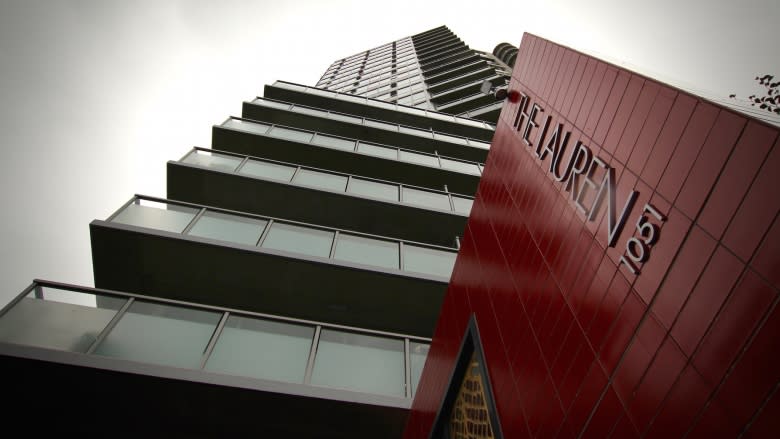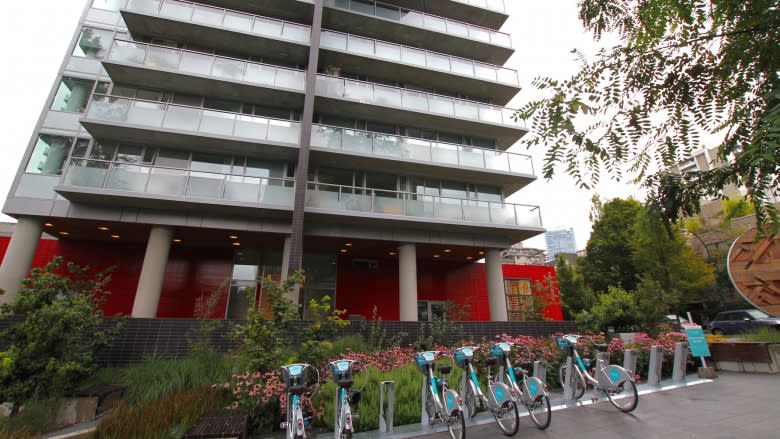Lease loophole lets owners jack up rent in West End rental tower, tenants say
Tenants of a newly-built Vancouver rental tower are facing sharp annual rent increases, and they say owners are taking advantage of a legal loophole to jack up the prices.
Many residents of The Lauren, a rental-only building owned by Westbank Corp. in Vancouver's West End, are being notified that their rent is being raised at a rate higher than what's allowed in Residential Tenancy Regulation, according to the tenants.
But the hike is completely legal — because they signed fixed-term leases with move-out clauses.
Lindsie Arbeiter, one of the original residents of the building since it opened its doors in 2014, has seen her rent go up eight per cent — from $1,550 to $1,675 — over the last two years. She says the hikes are slowly forcing her out of her apartment.
"I feel like Westbank doesn't have an incentive to keep the current residents there, because there's so many people that want to live in our building," said Arbeiter. "I'm sure there's a ton of people willing to pay the rent if we can't."
According to a resident manager who declined to give her name, all the units in The Lauren are under fixed-term contracts that include move-out clauses. At the end of each term, tenants must either move out, or sign a new lease at a reassessed market rental rate.
Westbank Corp. declined to provide an official comment.
A legal 'loophole'
NDP MLA and housing critic David Eby says fixed-term agreements are becoming more and more prevalent across Vancouver, and that it's alarming to see the practice used to bypass the province's rental controls.
"I think the way that some landlords have chosen to use the fixed-term lease is definitely a loophole that they're using to get around the rent control provision of the Act," Eby said.
Under month-to-month tenancy, and even fixed-term leases without a specified move-out date, landlords are only allowed to raise rent by a set amount that changes year to year, according to the Residential Tenancy Regulation. In 2015, that rate was 2.5 per cent.
But rental hikes at The Lauren exceed these rates.
Eby says the province is failing to recognize that the lease agreements are being misused, and that it would be easy for them to regulate the practice by imposing rent controls on lease renewals.
In an e-mailed statement to CBC, the Ministry Responsible for Housing said if "a tenant signs a fixed-term agreement and anticipates wanting to renew it, they should be aware that rental rate limits will not apply."
It's not the first time prices at the West End building have drawn attention.
Last year, a West End residents' association complained about high rents there, arguing the 22-storey building was pitched as a development that would increase the pool of affordable rental housing in the area.
A two-bedroom apartment was listed at nearly $3,500 per month in 2015.
'There's no ceiling'
Residents like Arbeiter say a fixed-term agreement is the only option.
Arbeiter has had to renegotiate her rent twice since moving into The Lauren. And even though she signed an agreement with a move-out clause, she said she has never had any intention of moving out, and has never been told she had to.
"They're not asking us to move out," she said. "They're asking us to renegotiate, to pay more money every year."
Arbeiter says she loves living in The Lauren, and is generally quite happy with the building's management — but she's uncertain about her future in the property.
Other residents expressed resentment towards the annual increases, but declined to comment in fear of losing out on their upcoming lease renewals.
"There's no ceiling to this, and that's what upsets me," she said. "What if we sign on for another year? What happens next year, and the following year? At what point is it too much, is it too expensive?"
With files from Rafferty Baker




